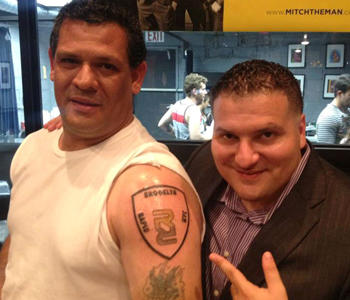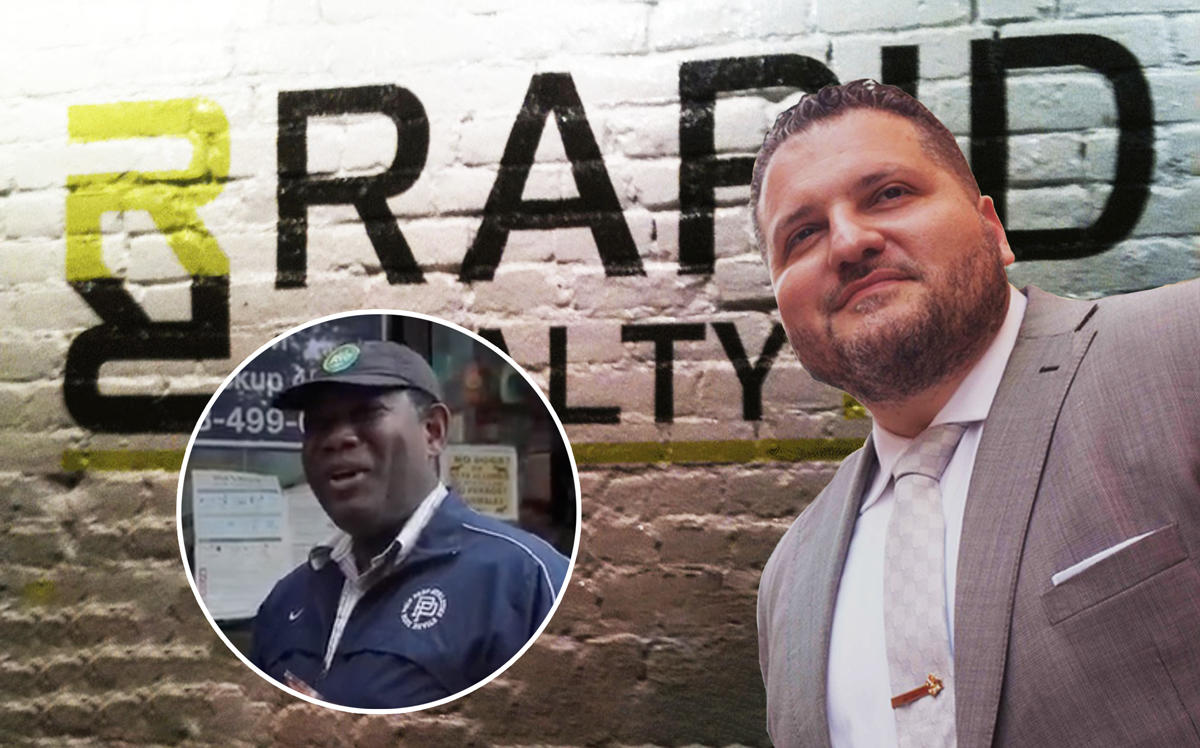Rapid Realty was once one of the fastest-growing residential brokerages in New York. And Anthony Lolli, the company’s brazen founder who highlighted the firm’s blue-collar roots and 24-7 hustle, was the architect of its rapid expansion. He had even dangled the possibility of taking the firm public.
But last year, amid major legal challenges and a mutiny of sorts against its leaders, Lolli and his partner quietly sold the firm, The Real Deal has learned. The brokerage, which had over 400 agents in Brooklyn in 2014 and was the borough’s biggest firm, now appears to be operating on a scaled-back platform. And Lolli is focused on other ventures, including multifamily investing and a real-estate school.
The new owner, Lolli and other sources said, is a Rapid employee named Jean Baptiste. Lolli said Baptiste was previously a silent partner in the company.
“It’s every entrepreneur’s dream,” Lolli told TRD on the phone this week, adding that he had entertained offers to sell the company even before last year’s challenges.
“You had Elon Musk who sold PayPal, you have P. Diddy that sold Bad Boy, Russell Simmons sold Def Jam,” Lolli, who started Rapid in 1998, said.
“Barbara Corcoran sold Corcoran,” Carlos Angelucci, Lolli’s business partner and former Rapid COO, interjected.
“And even Andrew [Heiberger] sold Citi Habitats in its heyday,” Lolli added. “These things are another notch under the belt. It’s an entrepreneurial goal to be able to build a company and exit.”
Baptiste declined to comment for this story. It’s not clear how much he paid for the company, though people currently and formerly affiliated with Rapid Realty threw out price tags ranging from $2 million or $3 million on the low end to as much as $8 million.
Angelucci and Lolli declined to comment on the financial terms of the deal, citing a non-disclosure agreement, though Lolli described it as a “handsome amount.”

Rapid Realty CEO Anthony Lolli (right) and an employee (Credit: Facebook)
A clandestine sale to a silent partner isn’t what Lolli had in mind back in 2012 and 2013, when the firm was at its zenith and agents were offered 15 percent raises in exchange for getting a tattoo of the company’s logo. At the time, Lolli said he was “seriously considering” taking the brokerage public.
“That’s where we were heading,” Martin Charles, who owned Rapid’s Forest Hills franchise, said in an interview this week. “That was the vision.”
Just so you know
Ashley Brigman, the former franchisee of Rapid’s Glendale office, said Lolli and Angelucci called employees to the brokerage’s Gowanus office the spring of 2018. They invited agents in groups of about 10 to come into a room with them. There, they disclosed the company’s troubles, and said the ownership was changing. They didn’t, however, name the new owner.
“There was no email blast,” Brigman said, “which at the end of the day is better.”
Another former franchise owner, Daniel Flete, said Lolli and Angelucci visited multiple franchises to talk to agents.
However, several brokers said they had received no official announcement about the sale of the company, and had only found out through the grapevine. No public statement was made.
Lolli and Angelucci said it was Baptiste’s wish that the sale be kept quiet. They declined to identify when exactly the company changed hands.
When they sold, Rapid had 38 franchises operating in the five boroughs, according to Angelucci. A review of public records by TRD from the end of 2018 identified 20 offices with 99 brokers – less than half the 227 brokers Rapid had at the end of 2017.
Brokering under a cloud
With his purchase, Baptiste inherited some of the challenges Rapid has been dealing with.
Last March, Florida-based lender Sky Financial sued the firm – as well as Lolli, Angelucci and another employee, Raymond Ruiz – in New York’s Eastern District U.S. court under the federal racketeering act.
Sky, which provided loans to Rapid Realty franchisees, claimed the company and its executives ran a Ponzi-like scheme in which money that was meant to be used to help those franchisees build out their offices ended up lining the defendants’ pockets. The case is ongoing in federal court.
Brokers who were there during the litigation described it as a deal-killer.
“Once homeowners or landlords got wind of what was happening, they didn’t want to work with me,” said Brigman.
After the lawsuit was filed, Rapid’s offices started closing, former brokers said. Some agents left due to the uncertainty, said Cathlena Battle, formerly an agent at Rapid’s Bushwick office.
“I didn’t try to get into the drama of it all,” she said. “I was trying to work my real estate business, but I just ultimately felt like I didn’t want to stick around when it was having so much…mud. It got too murky. And the owners just left. And nobody knew why they left.”
“The weight of the allegations I believe brought about the demise of the company,” said Charles, of the Forest Hills franchise. “If you are a company that is trying to expand and you’re selling that brand to other people and you have lawsuits hanging over your head, it’s not good.”
Around this time last year, Rapid was also dealing with a group of franchisees who said they planned to sue the company to get out of their agreements.
Rapid had sold several franchises even though its registration with the State Attorney General’s office authorizing the company to sell franchises had expired. A representative for the AG said Rapid is still not registered to sell franchises.

Anthony Lolli (right) with his business partner and former Rapid COO Carlos Angelucci (Credit: Michael Kraus)
The franchisees never filed a lawsuit. Sources said their lawyer, Kendrick Harris, was able to get them out of the agreements without going to court.
But Harris has since run into some trouble of his own. In February, he voluntarily resigned from the bar after acknowledging that he couldn’t defend himself against charges he faced including falsely notarizing a document, according to a court decision in the state’s Appellate Division entered February 21. Harris, according to Law360, is also facing criminal charges regarding the Harlem property and two others, and is charged with having taken roughly $106,000 from the estate of a Tuskegee Airmen.
According to the disciplinary charges, Harris allegedly used his coworkers’ notary stamps to falsely notarize his signature on a stipulation, which he then filed with the state Supreme Court in order to gain ownership of a home in Harlem. In an interview, he said the brownstone in question is in fact his own home, but acknowledged that he acted improperly.
“I should have been — and rightfully so — held to a higher standard because I’m an attorney,” he said. “I can’t disagree with that as it relates to that part.” He stressed his disbarment shouldn’t distract from the issues his clients brought up against Rapid.
But Lolli disagreed.
“This man and his cohorts made an effort to extort and defame us using social media and malicious tactics,” Lolli wrote in an email. “A lie can travel halfway around the world while the truth is putting on its shoes.”
“Hearing how karma has taken care of him made me jump up in those shoes and click my heels,” he added.
Lolli said he and Angelucci are now working on their portfolio of multifamily properties in the city. Lolli owns a dozen buildings in Brooklyn, Queens, the Bronx and Staten Island with a combined 40 units, according to Reonomy. His umbrella company, Lolli Brands, also houses a property management business, a real estate school, a startup that allows tenants to vet their landlords and even a talent-management and entertainment-production company. Lolli’s also working on a new venture.
“It’s not a brokerage or franchise concept,” he said. “It’s something different, but also in the real estate space.”
